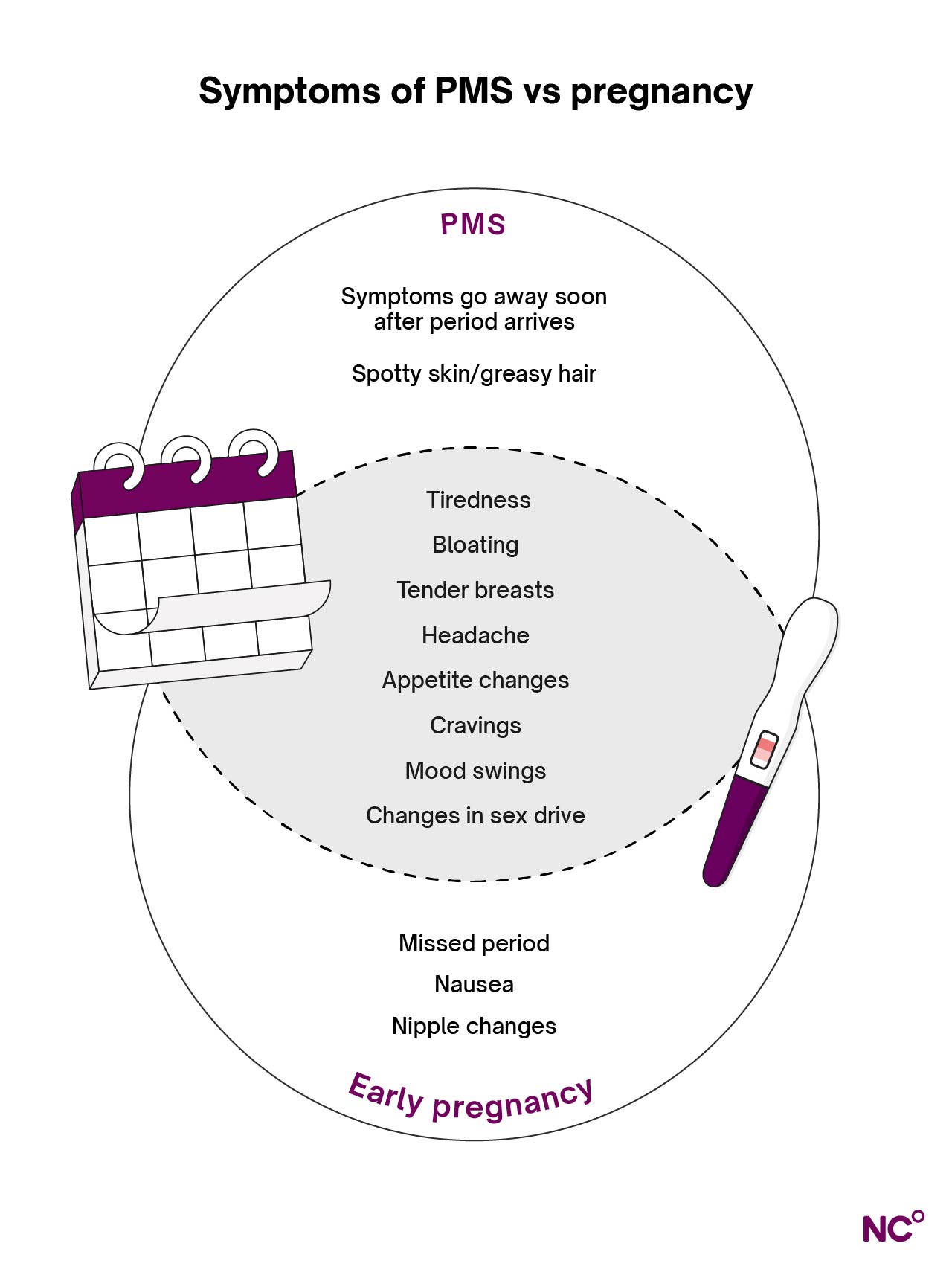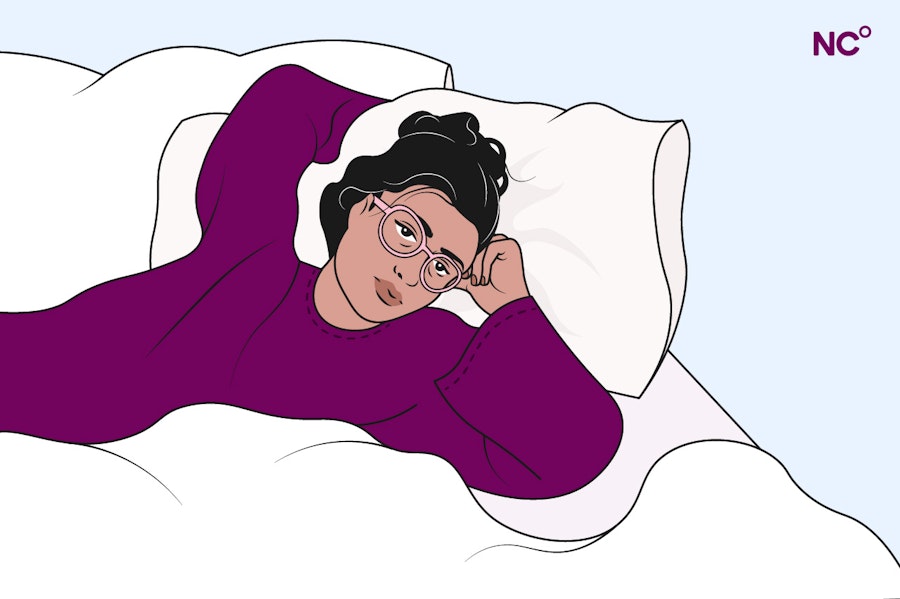PMS vs pregnancy symptoms: Key differences & when to test
Follows NC° Editorial Policy
At Natural Cycles, our mission is to empower you with the knowledge you need to take charge of your health. At Cycle Matters, we create fact-checked, expert-written content that tackles these topics in a compassionate and accessible way. Read more...
Key takeaways:
- Many of the symptoms associated with PMS are similar to early pregnancy signs
- While there are slight distinctions between PMS vs early pregnancy symptoms, the only certain way to tell whether or not you’re pregnant is with a missed period and a positive pregnancy test
- See your healthcare provider if you have disruptive PMS symptoms and/or if you think you may be pregnant
It can be quite difficult to tell the difference between premenstrual syndrome (PMS) symptoms and signs of early pregnancy. In this article, we’ll explore some of the most commonly confused symptoms to help you figure out if it’s PMS or pregnancy. We’ll also give you some tips on the best time to take a pregnancy test to be sure about what you’re experiencing and why. Many of these physical symptoms overlap, and if you’re trying to conceive, you may be wondering if the symptoms you’re experiencing indicate early pregnancy or just your regularly scheduled PMS.
What is PMS?
PMS refers to a group of physical and emotional symptoms that commonly occur leading up to your period, usually about a week or two before it begins, during your luteal phase. Over 90% of women say they get premenstrual symptoms, but there is much variation in how each person experiences PMS symptoms. Some may need to miss school or work to deal with the severity, while others find them to be a bother but not particularly disruptive [1].
Either way, common PMS symptoms like headaches, mood swings, and breast tenderness are thought to happen because levels of estrogen and progesterone hormones drop towards the end of the luteal phase if you are not pregnant. These symptoms typically subside within a few days of your period starting as your hormone levels begin to rise again at the start of your next cycle [1].
PMS vs pregnancy symptoms
Those PMS symptoms can be very similar to pregnancy symptoms, but they’re due to different biological functions. In early pregnancy, hormones like human chorionic gonadotropin (hCG) rise drastically, and this shift may lead to some of the physical and emotional symptoms that resemble PMS [2].
How early in pregnancy do symptoms start?
Each person’s pregnancy journey is unique, and each pregnancy is unique as well, so there’s no way to predict exactly when you’re going to experience pregnancy symptoms for the first time. However, some people reported pregnancy symptoms within one week of conception [3].
Just remember, it’s also very possible not to develop any early pregnancy symptoms at all, or start feeling them later into your first trimester as your pregnancy progresses. We know it’s easier said than done, but try to trust your body and speak to your healthcare provider if you have any questions or concerns.
PMS symptoms that are similar to early pregnancy symptoms
So, while we keep in mind that each pregnancy is unique, and this may or may not be your experience, let’s explore some of the most commonly confused PMS vs early pregnancy symptoms in a bit more detail.
1. Discharge
PMS
Cyclical hormone fluctuations influence how much vaginal discharge you experience, along with its color and consistency (learn more about discharge patterns here). Right before your period comes, you may notice heavier discharge [4].
Pregnancy
During pregnancy, you might also notice more discharge than usual, and this increases further in the last few weeks of pregnancy. It’s usually thin, clear, or milky white and doesn’t smell unpleasant. Our bodies produce more discharge throughout pregnancy to prevent infections from traveling up to the uterus and developing fetus. If you notice abnormal coloring (like green or yellow discharge) that smells unpleasant or strange, see your healthcare provider as soon as possible, as this may indicate an infection [4].
2. Cramps
PMS
Cramps are a common symptom of PMS. They’ll usually feel like a throbbing pain in your lower belly, and they’re an indication of the muscles in your uterus contracting to prepare to shed the uterine lining during your period. They can be quite uncomfortable and even downright painful, but they’re very common and usually manageable with methods like over-the-counter pain medication, heating pads to relax the muscles, and rest [5].
Pregnancy
On the other hand, early pregnancy symptoms sometimes include a phenomenon called implantation cramps. When the fertilized egg attaches to the uterine lining, some people report a light bleeding or spotting that may also be accompanied by light cramping. This feeling doesn’t happen in every pregnancy and hasn’t been scientifically verified, but if it does, the cramp will probably feel more faint or less intense than a normal period cramp and may also be accompanied by spotting that’s pink or dark brown in color [6].
3. Tender breasts
PMS
It’s common for your breasts to hurt right before your period. Hormone fluctuations in your body during this time can cause your breasts to feel tender and become a bit swollen [1].
Pregnancy
Your breasts may also change quite a lot during pregnancy, and early in your first trimester, you may notice them becoming larger and the veins becoming more visible under the skin. You may also notice the nipples start to darken and stand out more than usual — all of this can happen in addition to the tenderness that’s similar to the PMS symptom [7].
4. Fatigue
PMS
During your luteal phase, you may feel more tired than you do at other points in your cycle. You may need more sleep throughout the night or more naps throughout the day [5].
Pregnancy
Quite similarly, fatigue is most common early on in pregnancy during your first 12 weeks or so. Your body is going through major changes as the pregnancy develops, so you may need much more rest than usual [7].
5. Cravings
PMS
This phase of your cycle can come with some pretty intense cravings for your favorite comfort foods. You may even be hungrier in general if you’re experiencing PMS [5].
Pregnancy
The difference between PMS vs pregnancy cravings is that pregnancy cravings can be different from what you normally enjoy. You may feel suddenly drawn to certain food and drink you never liked before, or a strong aversion to others. Pregnancy can come with changes to your dietary preferences [7].
6. Headaches
PMS
You may also need to reach for OTC pain medications if you experience headaches with PMS. It’s a common symptom associated with that hormone drop during this time in your cycle [1].
Pregnancy
Headaches can happen early on in pregnancy, too, but for slightly different reasons. New pregnancy hormones are surging in your body, along with an increase in the volume of blood flowing through your body as well. Both of these factors can cause headaches [3].
7. Symptom: mood swings
PMS
With both PMS and pregnancy, it’s thought that hormonal fluctuations can affect our moods. Our disposition may be sensitive to changing hormone levels, so during PMS, you may feel more down than you normally do, or you may experience mood swings [1].
Pregnancy
Similarly, you may experience mood swings akin to depression or anxiety, along with states of joy, during pregnancy. While mood swings are common, we recommend seeing your healthcare professional and talking about your mental health while pregnant to make sure you’re getting the support you need [3].

Can you feel pregnant before you miss your period?
Considering all of those slight symptom distinctions, it can be very difficult to distinguish PMS vs pregnancy symptoms. But two in particular will be the most telling:
- Cravings: if you’re craving new foods or feeling sudden aversions to other foods you used to enjoy, this could indicate early pregnancy rather than PMS
- Breast changes: your breasts may feel tender and swollen with PMS, but the nipples will start to darken, and the veins will show more during pregnancy
So yes, if those two distinct symptoms are present and you’ve been sexually active, it’s possible that these are your first feelings of pregnancy. But remember — the only certain way to tell if you’re pregnant is with a positive pregnancy test — not by interpreting any physical or emotional changes.
How soon can I take a pregnancy test?
If you’re experiencing these symptoms and your period arrives on its expected date, or close to it, you can attribute them to PMS. If your period doesn’t arrive, it’s time to take a pregnancy test.
At-home tests are most accurate when performed from the first day of your missed period, so it’s recommended to wait until that date. It’s worth noting that pregnancy tests are about 99% accurate when performed following the instructions, so there is a very small possibility that the test could miss a pregnancy. Some pregnancy tests claim to give results as soon as 10 days after unprotected sex, which may be before your missed period, but taking regular digital tests too early can also lead to a false negative test result. For the most accurate at-home testing results, wait until your missed period date and follow the instructions that come with the test carefully [8].
If you’re using Natural Cycles to plan pregnancy you’ll receive a notification on the best days of your cycle to take a pregnancy test. Logging a positive pregnancy test result gives you access to NC° Follow Pregnancy where you can monitor the progression of your pregnancy and learn more about the development of your baby.
Could I have the symptoms of early pregnancy and not be pregnant?
Yes, since many of these symptoms of early pregnancy are so similar to (and easily mistaken for) PMS symptoms, it’s very possible to experience some of these symptoms and not be pregnant. Again, the best way to confirm your pregnancy is with a pregnancy test, not necessarily by trying to decode your symptoms.
When should I see a doctor
It’s a good idea to consult your healthcare provider whenever you have suspicions that you may be pregnant. If you get a positive at-home pregnancy test, you’ll need to see a doctor to set up your pregnancy care plan. It’s a good idea to see your healthcare provider if you get a negative test result but miss your period as well. They can provide guidance on next steps and offer more specific medical guidance considering your unique history and circumstances.
Furthermore, if your PMS symptoms are becoming disruptive to your everyday life and holding you back from regular activities and responsibilities, bring that to the attention of your doctor as well. If you have any concerns about your reproductive health or cycle more generally, your doctor can help you take steps toward feeling your best each day.
Get to know your body better with Natural Cycles
Planning a pregnancy can be a time of mixed emotions. Playing the waiting game isn’t easy — and it can be frustating not knowing what’s happening in our bodies right away. PMS and early pregnancy signs are just too similar, and each person’s pregnancy journey is too unique, to make predictions based on these signals alone. The good news is that NC° Plan Pregnancy can support you, providing tailored resources and notifications about what to expect along the way. See if Natural Cycles can support your fertility goals today.
Did you enjoy reading this article?
